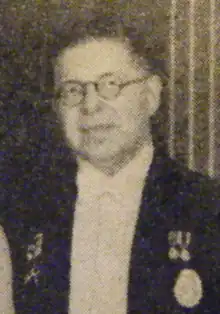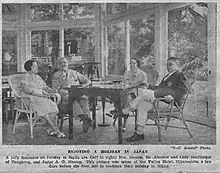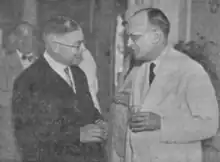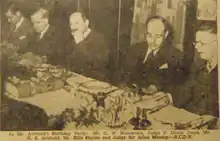Allan Mossop
Sir Allan George Mossop (30 July 1887 – 14 June 1965) was a British judge of South African origin who served in China. He was the Chief Judge of the British Supreme Court for China from 1933 to 1943.
Allan Mossop | |
|---|---|
 | |
| Chief Judge, British Supreme Court for China | |
| In office 1933–1943 | |
| Preceded by | Peter Grain |
| Succeeded by | Court abolished |
| British Crown Advocate for China | |
| In office 1925–1933 | |
| Preceded by | Hiram Parkes Wilkinson |
| Succeeded by | Victor Priestwood |
| Personal details | |
| Born | Allan George Mossop 30 July 1887 Cape Colony |
| Died | 14 June 1965 (aged 77) Cape Town, Cape Province, South Africa |
Early life

Mossop was born in Fish Hoek, in the Cape Colony in 1887 and was the seventh son of Joseph Mossop. He was educated at the Kingswood College, Grahamstown and the South African College, Cape Town. He then went to university in England attending Pembroke College, Cambridge graduating with an MA and LLB. He was called to the Bar of the Inner Temple in 1908.[1]
Career

Mossop moved to Shanghai, China soon after being called as a barrister and was admitted to practice before the British Supreme Court for China and Corea in 1909.
In 1916, Mossop was appointed the Crown Advocate for Weihaiwei when Hiram Parkes Wilkinson, the Crown Advocate for China who had held that position was appointed Judge in Weihaiwei. In 1926 on Wilkinson's retirement as Crown Advocate for China, Mossop was appointed Crown Advocate for China.[2] As Crown Advocate, Mossop was allowed to continue private practice as a barrister.

In December 1933, he was appointed Chief Judge of the British Supreme Court for China on the retirement of Sir Peter Grain.[3] He was knighted in May 1937.[4]
Closure of Court, Retirement and Death
At the beginning of the Pacific War, on 8 December 1941, Japanese troops occupied the court house of the British Supreme Court in Shanghai. Mossop was interned for 5 months before being repatriated to England.[5]
His appointment as judge was formally terminated in May 1943 after the Sino-British Treaty for the Relinquishment of Extra-Territorial Rights in China was ratified.[6]
Mossop returned to China in 1946 as an advisor to the British Embassy in China. He retired in 1947 and returned to his home in Fish Hoek, Cape Town, South Africa. He died on 14 June 1965 in Cape Town.[7] He was buried in Muizenberg Cemetery, Cape Town.
References
- Obituary, The Times, June 19, 1965, p10.
- North China Herald, 9 January 1926, p. 26
- October 25, 1933, p. 131 and North China Herald, 21 February 1934
- North China Daily News, 12 May 1937.
- Report Relating to His Britannic Majesty's Supreme Court in Japanese Occupied China, dated 24 September 1942, FO369/2719.
- China Order in Council, 1943, London Gazette, 25 May 1943, p. 2331
- Obituary, The Times, 19 June 1965, p. 10.
Further reading
- Clark, Douglas (2015). Gunboat Justice: British and American Law Courts in China and Japan (1842-1943). Hong Kong: Earnshaw Books., Vol. 1: ISBN 978-988-82730-8-9; Vol. 2: ISBN 978-988-82730-9-6; Vol. 3: ISBN 978-988-82731-9-5
[[Category:British ex[atriates in China]]